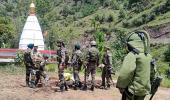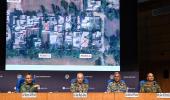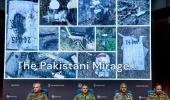'Looking at how quickly the hostilities were escalating, the nuclear threshold did not seem that far.'

"Many north Indian cities were under a lot of stress for the first time. This escalation is a sign of how modern warfare has changed," Praveen Donthi, tells Rediff's Archana Masih in the concluding part of the interview.
Mr Donthi is a Senior Analyst at the International Crisis Group, an independent organisation working to prevent wars and end global conflict; he is responsible for analysing existing and emerging conflict situations in India.
The three-day offensive has been unlike Kargil which was fought on the mountains far from the civilian population. This time civilians experienced sirens, blackouts, drones -- are we likely to see more of such occurrences because of the fragility of the ceasefire.
Yes.
It has been an upward escalatory spiral since the surgical strikes (2016), Balakot (2019) and Op Sindoor (2025).
There has been varying magnitudes of damage on either side, but enough to create concern among the public and international community.
Many north Indian cities were under a lot of stress for the first time. This escalation is a sign of how modern warfare has changed.
The hostilities were escalating faster than any other time in the history of India and Pakistan after they became nuclear powers.
India-Pakistan have to engage under the nuclear threshold. We might think that the nuclear threshold is too far away, but looking at how quickly the hostilities were escalating, it did not seem that far.
The hostilities resulted in the two DGMOs talking to each other. As someone who works in an organisation aimed at ending wars, does this prise an opening for some sort of civil engagement?
There is always a silver lining. Every crisis is also an opportunity.
We must remember that India and Pakistan did not resume bilateral trade even in the years after the 2019 crisis, or after the 2021 ceasefire agreement.
In the current hostilities, passions were running high on both sides. Even civil society did not want de-escalation which is worrying.
The small window of opportunity for both sides could come through back channel talks, away from the public eye.
If there are established channels to communicate then this could become an opportunity. Otherwise it will be another lost opportunity.

As someone who studies global crisis, how do you compare this escalation to what's happening in Ukraine, Israel, Palestine. How volatile has the subcontinent become after this escalation?
It destabilises the region.
It's not just about two powers at war. It brings in other geopolitical factors as well.
This war also became an advertisement for Chinese weaponry which President Trump wouldn't want.
The US does not want India to get bogged down in limited wars with Pakistan because of America's larger goal of countering China with its Indo-Pacific strategy.
There are geopolitical factors at play which could easily become a regional war considering India's other rival, China is firmly behind Pakistan.

What are some follow up measures to maintain this precarious ceasefire?
Ideally that would mean regular communication between the DGMOs, confidence building measures, resuming trade and bilateral engagement.
It is reported that there were two local Kashmiri men involved in the Pahalgam attack. The reasons behind home grown involvement needs to be dealt with.
New Delhi needs to look at the controllables by addressing the grievances and insecurities on the ground in Kashmir which is important for durable peace.
Feature Presentation: Aslam Hunani/Rediff.com










